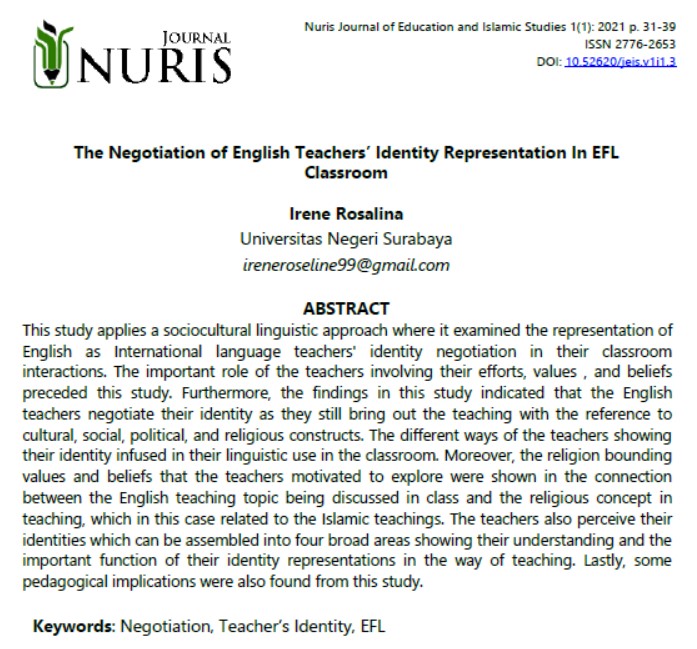The Negotiation of English Teachers’ Identity Representation In EFL Classroom
Main Article Content
Abstract
This study applies a sociocultural linguistic approach where it examined the representation of English as International language teachers' identity negotiation in their classroom interactions. The important role of the teachers involving their efforts, values , and beliefs preceded this study. Furthermore, the findings in this study indicated that the English teachers negotiate their identity as they still bring out the teaching with the reference to cultural, social, political, and religious constructs. The different ways of the teachers showing their identity infused in their linguistic use in the classroom. Moreover, the religion bounding values and beliefs that the teachers motivated to explore were shown in the connection between the English teaching topic being discussed in class and the religious concept in teaching, which in this case related to the Islamic teachings. The teachers also perceive their identities which can be assembled into four broad areas showing their understanding and the important function of their identity representations in the way of teaching. Lastly, some pedagogical implications were also found from this study.
Downloads
Metrics
Article Details

This work is licensed under a Creative Commons Attribution 4.0 International License.
License Terms
In submitting the manuscript to the journal, the authors certify that:
- They are authorized by their co-authors to enter into these arrangements.
- The work described has not been formally published before, except in the form of an abstract or as part of a published lecture, review, thesis, or overlay journal.
- That it is not under consideration for publication elsewhere,
- That its publication has been approved by all the author(s) and by the responsible authorities – tacitly or explicitly – of the institutes where the work has been carried out.
- They secure the right to reproduce any material that has already been published or copyrighted elsewhere.
- They agree to the following license and copyright agreement.
References
Abdely, A. Al. (2016). Types and Functions of Code-Switching in the English Language Types and Functions of Code-Switching in the English, (August).
Akiyama, R. (2016). Language , culture , and identity negotiation : perspectives of adolescent Japanese sojourner students in the Midwest , USA.
Debora Tri Ragawanti. (2009). Questions and Questioning Techniques: A View of Indonesian Students’ Preferences. K@Ta, 11(2), 155–170. https://doi.org/10.9744/kata.11.2.155-170
Gonzales, S. M., & Gabel, S. L. (2017). Exploring Involvement Expectations for Culturally and Linguistically Diverse Parents : What We Need to Know in Teacher Education, 19(2), 61–81.
Hall, K. (2005). Identity and interaction: a sociocultural linguistic approach, 585–614.
Hall, K. (2016). Identity and Interaction: A Sociocultural Linguistic Approach, (October 2005). https://doi.org/10.1177/1461445605054407
Hopkyns, S. (2014). The effect of global English on culture and identity in the UAE: a double-edged sword. Learning and Teaching in Higher Education: Gulf Perspectives, 11(2), 1–20.
Hui, L. (2015). Intercultural communicative competence , language proficiency , and study abroad, 4(2), 57–67.
Kinginger, C. (2013). Identity and Language Learning in Study Abroad, 46(3), 339–358. https://doi.org/10.1111/flan.12037
Koole, T. (2015). Classroom Interaction. The International Encyclopedia of Language and Social Interaction, 1–14. https://doi.org/10.1002/9781118611463.wbielsi092
Leeuwen, V. T. (2006). Critical Discourse Analysis. Elsevier, (2001), 290–294.
Lies Sercu ,et.al. (2005). Foreign Language Teachers and Intercultural Competence. Clevedon: Multilingual Matters LTD. Retrieved from http://bookfi.net/book/1161984
Mappiasse, S. S., & Bin Sihes, A. J. (2014). Evaluation of english as a foreign language and its curriculum in indonesia: A review. English Language Teaching, 7(10), 113–122. https://doi.org/10.5539/elt.v7n10p113
Mertens, D. M. (2009). Research and evaluation in education and psychology: integrating diversity ... Retrieved from http://books.google.com/books?id=m0N3tcIVds8C&pgis=1
Petek, E. (2013). Teacher’s Beliefs about Classroom Interaction and their Actual Practices: A Qualitative Case Study of a Native and a Non-native English Teacher’s In-class Applications. Procedia - Social and Behavioral Sciences, 70, 1195–1199. https://doi.org/10.1016/j.sbspro.2013.01.176
Sharifian, F. (2010). English as an International Language. Bristol: Multilingual Matters LTD.

